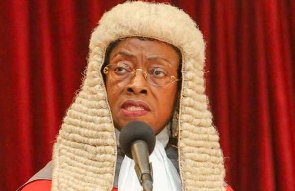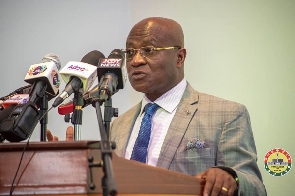Shall we start with this famously infamous quote from the Chief Justice of Ghana, Her Ladyship Justice Sophia Akufo:
“The practice of the law is not ‘A’ noble profession; it is ‘THE’ noble profession… Those of you lawyers and those of you lecturers who are busy advocating free scale, mass admissions into the professional law course, and mass production of lawyers, be careful what you wish for. So long as I have anything to do with it, it won’t happen”.
NOW MY TAKE:
Education, they say, is a right NOT a privilege. The ultimate aim of education beyond enlightening its products is also to make them earn a living. We do not go to school to acquire knowledge and relevant certificates for nothing. We go to school because we want to acquire knowledge/certificate so that we can use same to secure better jobs and be able to contribute meaningfully to the progress of society. Also worthy of note is that the choice of a career path is at the heart of education.
However, today, the sad reality in Ghana is that, whereas every student has the right to decide his/her career path, if that student chooses to become a lawyer, it is somebody else who has to decide whether or not that student should become a lawyer. And the underlying consideration for this decision is not based on the student’s interest; not based on his/her intellect, but based on access and probably how connected the student is.
Meanwhile, the Constitution of Ghana confers on every citizen the RIGHT TO EQUAL EDUCATIONAL OPPORTUNITIES AND FACILITIES [Article 25] and enjoins the State TO PROVIDE EDUCATIONAL FACILITIES AT ALL LEVELS AND MAKE THOSE FACILITIES AVAILABLE TO ALL CITIZENS [Article 38]. The net effect of these constitutional provisions as noted by the Supreme Court in Asare v AG Asare & GLC (2016) is that, under no circumstance should ACCESS to educational facilities or the lack of it be used as a factor to prevent people from realizing their RIGHT to education.
But what do we see today? The General Legal Council (GLC), which is a statutory body set up sometime in 1958 to regulate the legal profession and provide the opportunity for legal education in the country, has, rather astonishingly, metamorphosed into the greatest impediment to the pursuit of legal education. It is now the body that has gained notoriety in cutting short the ambitions of people wishing to read law in order to join the legal profession even in the midst of an overwhelming public outcry. How ironic!
This is because the GLC has deliberately failed to recognize that society is not static but dynamic, the nation is growing and therefore the structures that were put in place some 61 years ago for the training of lawyers CANNOT be fit for purpose today. In 1958, Ghana’s population was about 5 million people, and the University of Ghana was the only institution offering law at the faculty level. So LLB graduates from the University of Ghana automatically gained admissions into the Ghana School of Law to pursue the professional law programme. However, today, we are talking about 30 million Ghanaians and 14 accredited law faculties in the country offering LLBs. As to how the GLC will think that they can use a 1958 establishment or prescription to deal with a 21st century (2019 and counting) problem is not only mindboggling but the height of absurdity. How can we develop with such primitive conservative mentality?
Today, because of the notorious intransigence of the GLC to amend its ways to reflect the 21st century reality, hundreds and thousands of Ghanaian law students are compelled to cut short their career ambition at the LLB level because entry into “Makola” has become almost impractical in view of the rising numbers. Meanwhile, the overwhelming demand for lawyers in the country continues to be on the rise. How can a country of 30 million people pride itself with less than 2,800 practicing lawyers? To make matters worse, over 87% of these lawyers practice in Accra, leaving the rest of the 15 regions to make do with the remaining 13%.
Also worthy of note is the fact that over 94% of these lawyers are into private practice. Access to justice has become very expensive in the country. The Legal Aid Scheme, which was established by the State to provide legal assistance to the poor and ensure that rule of law and access to justice extend to the vulnerable who would otherwise be excluded from the formal justice delivery system, has only 22 lawyers serving the whole nation. If you were to consider this number as against the population of the poor/vulnerable in the country, the lawyer-client ratio stands at 1 lawyer to over 1.2 million Ghanaians. No wonder access to justice in Ghana has become such a scarcity. Our fellow country men and women are made to rot in jail or on remand, not because they’ve been pronounced guilty, but because they are unable to get lawyers to defend them in court. This is certainly not a Ghana to be proud of. But no one cares?
We are also told that the AG department alone requires not less than 4,000 lawyers to effectively function. Each of the 260 District/Municipal/Metropolitan Assembly (MMDAs) in the country needs an established legal department with not less than 10 lawyers but in view of non-availability of lawyers, less than 20% of these MMDAs have legal departments. That is how scary the figures look. With these pathetic statistics, how can there be a proper justice delivery system in the country? And instead of her as the head of the nation’s judiciary to be concerned and worried about this shameful development, Chief Justice Sophia Akufo is rather interested in safeguarding the prestige of the profession and not wanting many lawyers to be produced in the country.
Really and truly, the entrance exams conducted by the GLC, through a so called independent examination council has been one of the tools the authorities use to arrest the ambitions of people wishing to be lawyers. There cannot be any justification, for instance, for the GLC to tell us that out of 1,820 LLB graduates who sat for this year’s ‘Makola’ entrance exams, only 128 (constituting 7%) qualified for admission into ‘Makola’ to pursue the professional law programme. And interestingly but not surprisingly, NONE OF THE BEST GRADUATING STUDENTS from any of the 14 accredited LLB offering institutions was among the 7% that passed. Even the marines will NOT accept this “coincidence” as we are being told.
If nothing untoward is being perpetuated, why does the GLC compel the candidates to sign an undertaking not to challenge their results no matter how legitimate their concerns may be? We cannot be fooled all the time. To tell us over 92% of LLB holders are not fit for purpose means the entire system is broken and needs a complete overhaul immediately. It is in fact, tantamount to saying that all the 14 accredited law faculties in the country are running a Ponzi scheme, taking huge money from students and failing to prepare them to be worthy for purpose. So, just like the BoG did to the banks recently, the GLC, acting as the regulator of legal education, should take immediate steps to close down all these law faculties.
PROPOSALS/RECOMMENDATIONS/WAY FORWARD
On the so called results of the 2019 ‘Makola’ entrance exams, which the whole nation (of course, with the exception of the CJ and her darling GLC) has REJECTED, I suggest that the GLC be guided by its own precedence and reduce the pass mark of 50% to 45% so that some more students can be admitted for the professional law programme. I am making this proposal also because the Deputy Attorney General of the Republic, Hon. Joseph Dindiok Kpemka, who is a member of the GLC, said on Joy fm’s Newsfile on Saturday, September 28, that, the GLC had, in anticipation of many intake into the Ghana School of Law this year, rented more facilities that can admit at least 1,000 students. That is my recommendation to deal with the immediate challenge confronting us this year.
In the short to medium and long term, there must be REFORM to legal education in the country due to the perennial systemic challenges. We cannot maintain a post-colonial 1958 arrangement in 2019. I CANNOT understand why the Ghana School of Law should continue to be the ONLY institution in Ghana accredited by the GLC to teach the professional law course? Why don't we open up to allow some of the LLB offering institutions that have the requisite facilities and faculties like the GIMPAs, the UGs, the Mountcrests and the KNUSTs to also teach the professional law course?
Alternatively, why can’t we allow LLB holders to go obtain their professional law education/training anywhere including ‘Makola’ so that when they are done, all the students completing the professional law course from these institutions as well as from the Ghana school of law, will be made to take the same bar exams regardless of where they obtained their professional education/training, like the ACCAs do? Is this a rocket science that we cannot do? Mind you, the law in Section 13 of Act 32 provides that the State must use other educational institutions when the Ghana law school is inadequate for purpose. Why is the GLC being this stubborn? When people who make a living from the law; who eat the law; who drink the law; who teach the law; who practice the law; who bath with the law and do everything with the law end up breaking the law with such impunity, then you know that our gods are getting crazy.
I do not know where these LLB holders/students who have endured and continue to endure this injustice from people who should know better can go and get justice in their genuine quest to become lawyers and serve humanity. Almost all the institutions of state have failed them. When Parliament had the opportunity to change the narrative, they failed to do that. The head of the country’s judiciary also says ‘over her dead body’ will she allow ‘mass production of lawyers’. The executive arm of government is also not talking. Where else can the students go to seek justice? Who else will listen to them? Perhaps, only ALLAH can give them justice.
In the meantime, the students remain unwaveringly resolute and are bent on fighting the system to compel it to respond to the exigencies of time. Fortunately, an overwhelming majority of the Ghanaian people including lawyers agree with them and share in their plight. The students are not only inspired by Article 21 of the United Nations Declaration on Human Rights which provides that the will of the people must form the basis for the authority of their government but also by the preamble to the 1992 Constitution of Ghana which reposes the sovereignty of Ghana in us (the people of Ghana) and not in Madam Sophia Akufo. Ghana is not governed by her will and emotional instincts.
The CJ and her darling GLC must act in accordance with the wishes of the Ghanaian people in whom sovereignty resides. We say we want an immediate reform to the nation’s archaic legal education regime to reflect the societal reality of today. We say we want the constitutional rights of our citizens including their right to education and choice of career realized without artificial impediment. We say we want JUSTICE for our own. Injustice is not only associated with the committal of fraud or armed robbery. Injustice is also when State actors deliberately create a scheme that curtails the rights of its citizens to have equal access to legal education as enshrined in our constitution and relevant laws. Reform and Open up legal education NOW, else ALUTA continua!!!
Assalamu alaik
Opinions of Monday, 7 October 2019
Columnist: Alhaji Iddi Muhayu-Deen



















